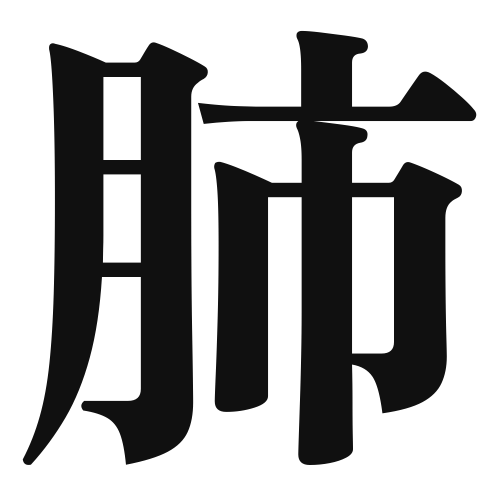1. Overview of Meaning
The kanji “肺” (pronounced “hai”) means “lung” in English. It refers to the vital organ in the respiratory system responsible for gas exchange, allowing us to breathe in oxygen and expel carbon dioxide.
2. Formation and Radicals
Formation of the Kanji: The kanji “肺” is a phonetic-ideographic character (形声文字). It combines the radical for “flesh” (肉) on the left, indicating that it is a body part, with the phonetic component “はい” (hai) on the right, which suggests its pronunciation.
Radical: The radical for “肺” is 肉 (niku), which relates to meat or flesh, emphasizing its connection to the human body.
3. Examples of Usage
Common Words and Phrases:
- 肺炎 (はいえん, haien) – pneumonia
- 肺活量 (はいかつりょう, haikatsuryou) – lung capacity
Example Sentences in Daily Conversation:
- 彼は肺炎にかかってしまった。 (かれははいえんにかかってしまった。) – He has come down with pneumonia.
- 肺活量を測るために、息を深く吸ってください。 (はいかつりょうをはかるために、いきをふかくすってください。) – Please take a deep breath to measure your lung capacity.
4. Synonyms and Antonyms
Similar Kanji:
- 心臓 (しんぞう, shinzou) – heart: While both are vital organs, the heart pumps blood, whereas the lungs are responsible for breathing.
Antonyms:
- 無肺 (むはい, muhai) – literally means “without lungs,” used in a figurative sense to describe something lacking life or vitality.
5. Cultural and Historical Background
Relation to Japanese Culture: In traditional Japanese medicine, the lungs are associated with the element of metal and are believed to be connected to emotions such as grief. This reflects a holistic view of health.
Proverbs and Idioms:
- 肺を痛める (はいをいためる, hai o itameru) – to suffer from lung issues, often used metaphorically to describe someone who is overworked or stressed.
